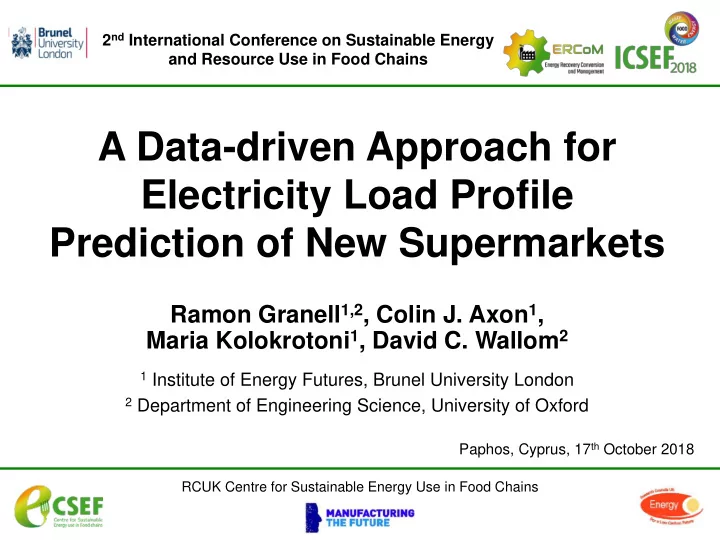

2 nd International Conference on Sustainable Energy and Resource Use in Food Chains A Data-driven Approach for Electricity Load Profile Prediction of New Supermarkets Ramon Granell 1,2 , Colin J. Axon 1 , Maria Kolokrotoni 1 , David C. Wallom 2 1 Institute of Energy Futures, Brunel University London 2 Department of Engineering Science, University of Oxford Paphos, Cyprus, 17 th October 2018 RCUK Centre for Sustainable Energy Use in Food Chains
2 nd International Conference on Sustainable Energy and Resource Use in Food Chains Research Question What should the typical daily electricity load profile of a new supermarket look like? NEW STORE RCUK Centre for Sustainable Energy Use in Food Chains Brunel University London University of Oxford 2
2 nd International Conference on Sustainable Energy and Resource Use in Food Chains Introduction Typical approach based on thermal engineering models of the building Our approach: data-driven method to find stores with similar (though not identical) basic building and retail-related features and combine their profiles EXISTING STORE NEW STORE EXISTING STORE EXISTING STORE RCUK Centre for Sustainable Energy Use in Food Chains Brunel University London University of Oxford 3
2 nd International Conference on Sustainable Energy and Resource Use in Food Chains Data-driven models vs Eng. models Advantages Drawbacks • • Only basic building information Reliant on quality of the data Data • required Assumes small variation amongst Mining • Widely applicable stores • Incorporates real use of energy • • Eng g More complete picture Extensive building information • Well-established methods required Model • Difficult to incorporate human factors RCUK Centre for Sustainable Energy Use in Food Chains Brunel University London University of Oxford 4
2 nd International Conference on Sustainable Energy and Resource Use in Food Chains Method We used a modification of the K-nearest neighbours algorithm (local principle) : 1.Selecting the K-nearest stores Calculate the profile of the new store averaging the profiles of these K stores RCUK Centre for Sustainable Energy Use in Food Chains Brunel University London University of Oxford 5
2 nd International Conference on Sustainable Energy and Resource Use in Food Chains Exploring the Data • Experiments performed over UK supermarkets of the same company (N=196), pretending that each supermarket is a new one (leaving-one-out) • Separated Summer, Winter, Spring/Autumn profiles computer over 1-h readings from 2012 to 2015 (Monday-Saturday) • Separated experiments over two sets: stores that use just electricity (SE, N=86) and stores that use electricity and gas (SEG,N= 110) • Implemented in C++ Feature set: Floor area (m 2 ) Food, General merchandising, Cafeteria, Sales, Office, Total Location Geographic co-ordinates RCUK Centre for Sustainable Energy Use in Food Chains Brunel University London University of Oxford 6
2 nd International Conference on Sustainable Energy and Resource Use in Food Chains Results • Evaluators for the results (average over all the predicted store profiles): Euclidean distance (ED, kWh) and normalised percentage difference with respect to the original profile (NP, %): Stores elec. only Stores elec. & gas ED(kWh) NP(%) ED(kWh) NP (%) Wint 72 18 121 22 Summ 54 16 64 15 Spr/Au 59 16 86 17 • Winter errors are higher due to temperature variability and heating RCUK Centre for Sustainable Energy Use in Food Chains Brunel University London University of Oxford 7
2 nd International Conference on Sustainable Energy and Resource Use in Food Chains Conclusions and future work • Data-driven approach to predict the electricity profile of new supermarkets evaluated over a real data-set of 196 stores • Elevated prediction error to real use (currently) • Future work • Improving our current model: • more sophisticated methods to combine the K most similar stores: kernel functions and regression models • include uncertainty in the prediction • incorporate the external temperature: predicting profiles over specific Heating Degree Day bands • Analyse gas consumption in a similar way and test over other supermarket data- sets RCUK Centre for Sustainable Energy Use in Food Chains Brunel University London University of Oxford 8
Recommend
More recommend